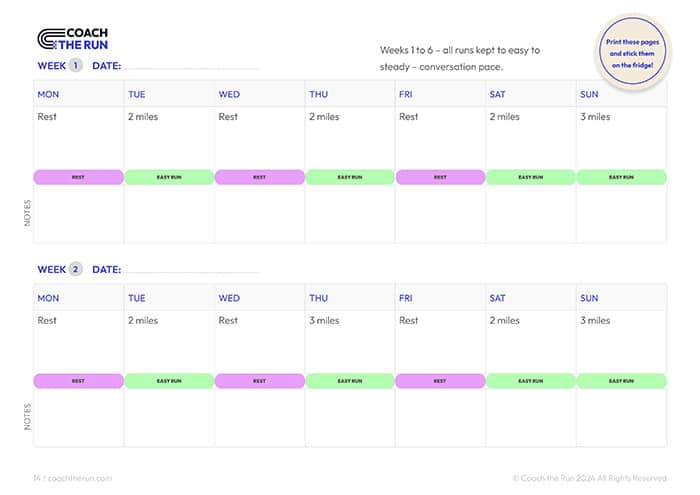


Just entered a half marathon?
You’re taking on a fantastic distance that presents a real training challenge, without the exhaustion that comes with a full marathon. Committing to this race is already half the battle, right? However, there are a few other important aspects to consider before you hit the road for your first training run. So, before you lace up your running shoes and head out, let’s delve into what you need to know with this guide to training plans for half marathon.

Running a half marathon can be an excellent precursor to attempting a full marathon. Since it covers half the distance, it allows athletes to develop the necessary stamina, cardiovascular endurance, and mental toughness required to conquer 26.2 miles.
Running may appear to be a straightforward sport, but when it comes to training for a half marathon, there are several factors to consider to ensure a successful race day.
Firstly, it is crucial when you train for a half to gradually build up your endurance, avoiding overexertion and potential injury risk. Remember, it is perfectly acceptable to feel tired and incorporate walking breaks into your training routine.
Next, focus not only on your physical strength but also on nurturing your mental fortitude, empowering yourself to achieve your desired timing objectives. By striking a harmonious balance between these elements, you pave the way for a triumphant half marathon experience.
Running a half marathon can be a truly transformative experience, especially for beginners who never envisioned going that distance. To help you achieve that life-changing moment, here are some valuable tips to keep in mind:
A 12-week training plan is considered standard for half marathon runners, particularly for beginners. This timeframe allows for a gradual mileage increase, preventing excessive strain. It is recommended to aim for 3-4 days of running per week, interspersed with rest days.
The half marathon distance commands respect and demands dedicated training over a few months. Our 12-week beginner’s half marathon plan, outlined below, emphasizes the importance of not rushing into it without preparation. This is a test that cannot be crammed for; it requires commitment and effort.

It may seem counterintuitive, but slowing down your pace can sometimes be more beneficial. Longer runs at a slower pace allow you to build up distance and endurance without overtaxing your body. The idea is to find a comfortable pace that you can maintain throughout the run.
One of the most common mistakes made by beginners is pushing themselves too hard, too soon. Running too many miles at a fast pace can lead to injuries and a loss of motivation. When you run too fast, your body gets fatigued, increasing the risk of injuries and requiring longer recovery times. If you find yourself gasping for air or experiencing pain at the end of your run, it’s a clear sign that you’re going too fast. In fact, the slower you go on your easy runs, the better.
If you have a running buddy, take advantage of the opportunity to have a good chat at a conversational pace. Engaging in conversation naturally helps you maintain an easy pace and prevents you from pushing yourself too hard.
Hill training is a vital aspect of preparing for your half marathon. Running on an incline challenges your muscles and strengthens them, making them more resilient and efficient. It also forces you to focus on your form, keeping your strides shorter and more controlled.
Don’t let the prospect of hill training intimidate you; start small and gradually increase the duration or number of repetitions as your body adapts. Running hills builds endurance and helps you conquer any challenging terrains you may encounter during the race.

One of the most significant challenges in a half marathon is maintaining your endurance for 13.1 miles. To develop this vital element, you’ll need to incorporate long runs at a comfortable pace into your training schedule.
Begin with shorter long runs and gradually increase the distance until you are comfortable running 10-12 miles at a time. This will help build up your stamina and give you the confidence to conquer the half marathon distance on race day.
As with any training plan, it’s essential to listen to your body and adjust accordingly. If you experience pain or discomfort, take a rest day or reduce the intensity of your workouts. Ignoring warning signs can lead to injuries that can derail your entire training plan. Recovery runs, cross-training, and rest days are all essential parts of a successful training plan.
Moreover, taking care of yourself outside of running is just as crucial. Make sure you get enough sleep, stay hydrated, and fuel your body with nutritious foods to support your training.
Cross-training is a vital component of any training schedule. It involves incorporating other forms of exercise, such as pilates, yoga, biking, swimming, or strength training, into your routine. This helps work different muscle groups and prevents overuse injuries.
Cross-training and strength training also provide a mental break from running, helping you stay motivated and avoid burnout. When you cross-train, just make sure not to overdo it and listen to your body’s signals.

When it comes to running, the choice of your shoes can make a significant impact. It goes without saying that to conquer 13.1 miles, it is crucial to wear footwear that not only fits well, but also ensures the utmost comfort for your feet. Hence, we highly recommend investing in a good pair – one that offers sufficient cushioning to shield you from the unforgiving pavement, while also providing the right amount of firmness for a propulsive stride mile after mile. By doing so, you not only safeguard your body from the impact of the ground but also enhance your overall running experience.
It’s essential to get fitted at a specialised running store by an expert who can analyse your gait and recommend the best shoe for you. Wearing improper footwear can lead to discomfort, injuries, and poor performance.
Lastly, make sure to plan early for race day. This means setting your alarm, getting proper rest the night before, and making arrangements for transportation to and from the event.
It’s also crucial to have a pre-race meal planned out that is easy on your stomach and provides you with enough energy. Avoid trying new foods or drinks on race day; stick to what you know works for your body.
Being prepared and organised on race day will help reduce stress and allow you to focus on the half marathon race itself. Don’t forget to have fun and enjoy the experience, no matter the outcome. The half marathon is a significant achievement, and completing it should be celebrated when you cross that finish line, regardless of your time or rank.
Training for a half marathon requires effort and dedication, but with the right training plan, it can be an achievable goal for every runner. At Coach the Run, we cater to everyone, whether you’re a beginner or an experienced runner. We offer a range of half marathon training plans designed to help you conquer the half marathon distance. So why wait? Begin your journey today and download one of our complimentary half marathon training plans:
This comprehensive 12-week training plan, crafted by our esteemed expert and London Marathon champion, Mike Gratton, is perfect for those first timers embarking on their first half marathon journey. This exceptional plan will guide you towards successfully completing a half marathon. If you are a beginner runner, this is the plan for you. The transition from a 10k or 10-mile race to your first half marathon may appear daunting for new runners, but fear not. This novice-friendly plan focuses on gradually increasing weekly mileage while incorporating rest days and cross-training to prevent injuries. Additionally, it features a slower-paced long run, allowing you to enhance your endurance effortlessly.
If you have some experience and want to break the 2-hour barrier, this training plan is tailored towards improving speed and endurance. Focusing on speed workouts, tempo runs, and long runs, it aims to help you develop the necessary pacing and efficiency needed to achieve a sub-2-hour half marathon. Crafted by our head running coach, Mike Gratton, who won the London Marathon in 1983, this exceptional 12-week training program is designed to lead you towards achieving a half marathon completion time of under 2 hours.
For those looking to up their game even further, this plan is perfect for experienced runners with a solid foundation. The training includes challenging speed workouts, hill runs, and longer weekend runs tailored to help you break the 1-hour 40-minute mark. This half marathon training program is made by our very own renowned head coach Mike Gratton, winner of the 1983 London Marathon. This 12-week training programme is designed to guide you towards a sub 1 hour 40mins half marathon finish.
For the most advanced runners seeking an ambitious time goal, this plan incorporates track workouts, race pace runs, and longer tempo runs to sharpen your physical and mental readiness for a sub-1 hour 25-minute half marathon. Created by our head running coach, Mike Gratton, who won the London Marathon in 1983, this comprehensive 12-week half marathon training plan is specifically designed to guide you towards finishing in sub 1 hour and 25 minutes.
While defining a “good” half marathon time is subjective and depends on one’s fitness level and experience, there are some benchmarks worth considering. According to recent statistics, an average half marathon time for men is around 2 hours and 2 minutes, while women’s average stands at 2 hours and 21 minutes. On the other hand, elite runners may aim for faster times, like sub-1 hour 30 minutes or even sub-1 hour 15 minutes.
If you’re a beginner, don’t get discouraged if your time falls outside these averages. Focus on improving your personal best and gradually work towards more ambitious goals. Remember that everyone’s journey is unique, and as long as you stay consistent with training and listen to your body, you’ll continue to make progress.

Discover the ultimate test for your training – take part in a thrilling half marathon event! These races offer a real challenge and an incredible opportunity to push your limits, showcasing the fruits of your hard work and unwavering dedication. So, lace up those shoes, find a race close to your home, and dive headfirst into the challenge.
Ready for a whole marathon challenge? Take a read of our 4 hour pace marathon blog.
Join our mailing list to stay up to date with the latest UK running events, training tips, and exclusive offers on running products. Rest assured, we value your privacy and would never dream of selling your address. Sign up now…
Share this article
Wondering “how fast should I be running?” The answer depends on your fitness level, running...
Pick up any running book or running magazine, listen to a coach down a running...
Introduction: the unwelcome bonk We’ve all experienced it at some point – that dreaded sudden...
Hi Mike, what strategies can I use to fuel my marathon training effectively while keeping...
Designed by our head coach, Mike Gratton, winner of the 1983 London Marathon, this 12-week...
Introduction Run Less Run Faster is a scientifically-backed training method that allows experienced runners to...
We’re here to make sure you’re up-to-date with the latest running tips, events and product discounts – we’ve always got your back! Rest assured, we value your privacy and would never dream of selling your address.
BONUS: Sign up today and receive a FREE code for our Sub-4-Hour Marathon Plan
Your privacy settings
Manage Consent Preferences
Necessary
Analytics
Embedded Videos
Marketing
Facebook Advanced Matching
Facebook CAPI